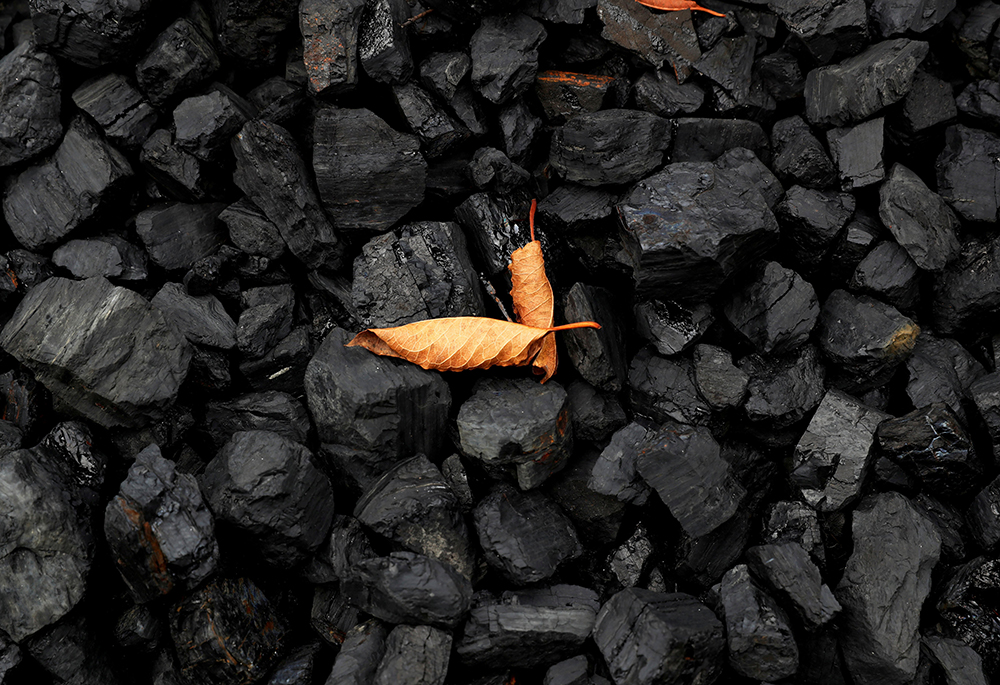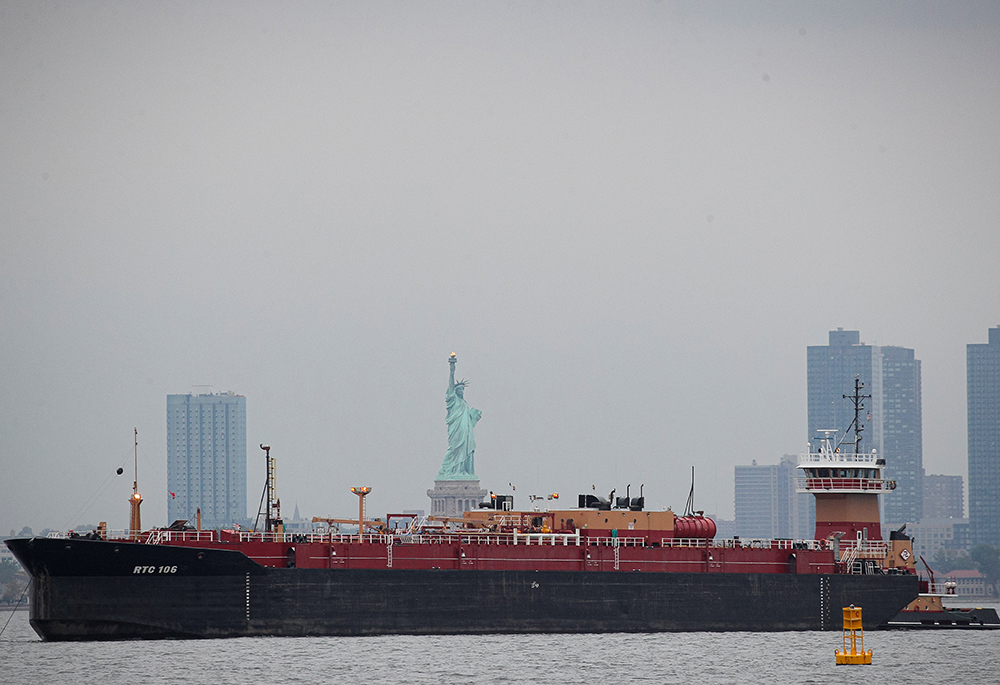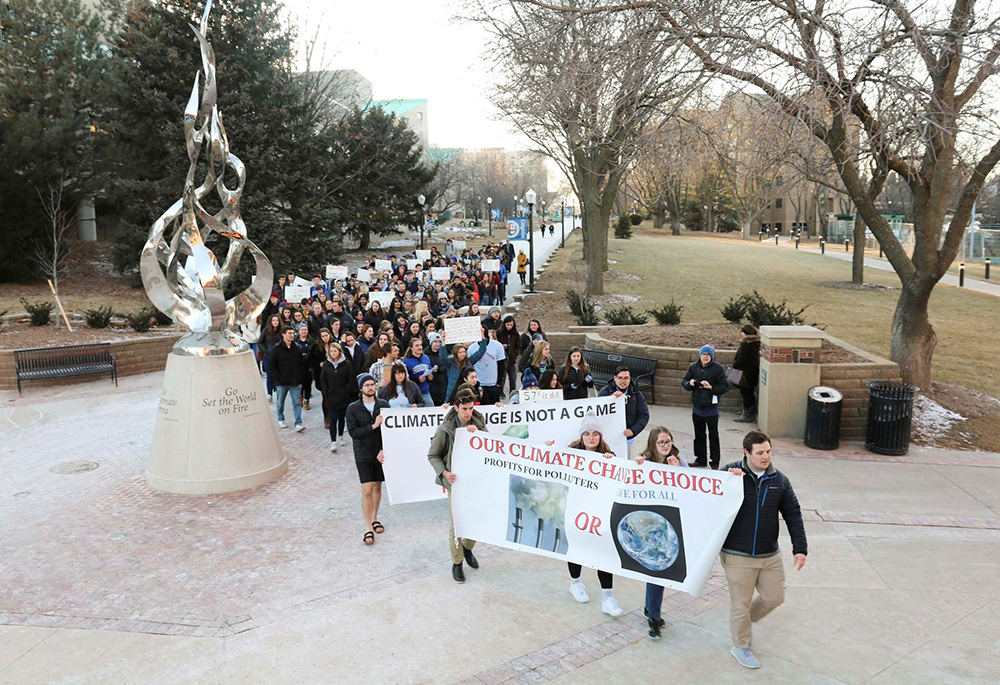
A leaf sits on top of a pile of coal in this illustration photo. (CNS/Reuters/Shannon Stapleton)
Last summer, the Catholic Theological Society of America, or CTSA, the principal association of Catholic theologians in North America, resolved to divest from fossil fuels. This commitment responded to the Vatican's call, followed the Vatican's example and applied the U.S. Conference of Catholic Bishops' revised socially responsible investment (or SRI) guidelines.
This fall, the Catholic Theological Society of America fulfilled its divestment resolution.
CTSA's story models how critical theological dialogue on justice and the signs of the times can inspire Catholic action.
It is also significant because, like National Catholic Reporter, divestment forced CTSA to leave Christian Brothers Investment Services, or CBIS, and find another firm to manage its endowment. Christian Brothers Investment Services oversees almost $10 billion in assets for Catholic institutions and guided the U.S. bishops' SRI guideline revision. However, Christian Brothers Investment Services rejects fossil fuel divestment and does not provide this option to clients.
Catholic Theological Society of America's experience exemplifies why and how Catholic institutions can discern to live church teaching through fossil fuel divestment.
Beyond crisis
In 1990, Saint John Paul II warned that the " 'greenhouse effect' has now reached crisis proportions as a consequence of industrial growth, massive urban concentrations and vastly increased energy needs."
At that time, the amount of carbon dioxide in the atmosphere was about 350 parts per million (ppm). Today, human activities — especially fossil fuel combustion — have exploded that number to more than 420 ppm. This is by far the most atmospheric carbon in the history of civilization. Humanity is beyond crisis.
Human-caused greenhouse gas emissions are the main reason the planet has warmed about 1.1 C since the Industrial Revolution. This warming is already harming human and non-human creation, which Christians are called to love and care for.

A tugboat in New York City pushes a fuel oil barge past the Statue of Liberty Oct 13, 2021. (CNS/Reuters/Brendan McDermid)
Drought spurs food and water stresses. Glacial melt causes sea level rise that displaces populations. Warmer air catalyzes more frequent severe weather events like hurricanes that devastate communities. Heat ignites wildfires that drive families from their homes.
These and many other dynamics spark violence. The U.S. Department of Defense calls climate change an "existential threat" that "will continue to have worsening implications for U.S. national security."
These effects also spur a host of health problems like malnutrition, cardiovascular diseases, respiratory disorders and mental illness. In 2021, during the height of the COVID-19 pandemic, 230 internal medical journals published an unprecedented joint editorial calling climate change "the greatest threat to global public health."
All of these impacts disproportionately harm the economically poor and communities of color.
The Nobel Prize-winning Intergovernmental Panel on Climate Change warns that if warming exceeds 1.5 C, the effects of climate change will rapidly accelerate and potentially become irreversible. Most climate scientists agree it is no longer possible to avoid the 1.5 C warming threshold. However, the IPCC identifies a range of temperature scenarios by 2100 based on choices made today.
If all nations live up to their current emissions reduction pledges — which is by no means guaranteed — the world could reach 2.9°C by 2100. Such warming could produce about 20 feet of global sea level rise. This would inundate 50 major global cities and displace millions. Climate Central visualizes this world for which we are currently on track.
Catholics can protect dignity and life by limiting warming through prudent climate policies that include fossil fuel divestment.

Wind turbines are seen Feb. 12, 2019, in Big Spring, Texas. (CNS/Reuters/Nick Oxford)
Church teaching and prudence
St. John Paul II, Pope Benedict XVI, Pope Francis and bishops' conferences — including in the U.S. — have consistently recognized climate change as an urgent moral issue and called for social justice through policy responses.
Additionally, 130 years of church teaching emphasizes that economic choices must be guided by the robust framework of Catholic social teaching and cannot narrowly pursue short-term financial return.
St. John Paul II warned against an "idolatry of the market" that excludes moral considerations. Rather, he stressed the need for values-based action to protect "common goods such as the natural and human environments, which cannot be safeguarded simply by market forces" of immediate profit.
Pope Benedict XVI affirmed, "Every economic decision has a moral consequence." He also lamented "the lack of far-sighted official policies or to the pursuit of myopic economic interests, which then, tragically, become a serious threat to creation." He urged that "when making use of natural resources, we should be concerned for their protection and consider the cost entailed – environmentally and socially – as an essential part of the overall expenses incurred."
This is what the U.S. bishops' conference reiterates in its SRI guidelines: Funding Catholic ministry does not justify any means of fundraising. The church also stresses that fidelity and credibility require living its own teaching. This is what two students bravely said to Pope Francis:
Young people value authenticity and deplore hypocrisy. We told Pope Francis that U.S. Catholic leaders' failure to share and enact the church's own climate teachings is causing many in our generation to become disillusioned with the church.
The church's climate change teaching also stresses prudence, which St. Thomas Aquinas classically defined as "right reason applied to action." This is what the U.S. bishops emphasized in their 2001 document "Global Climate Change: A Plea for Dialogue, Prudence, and the Common Good."
Amid the climate emergency, church teaching calls for science-based action guided by Catholic values.

People rally at Creighton University Feb. 20, 2020, in Omaha, Nebraska, calling for the Jesuit-run school to fully divest from fossil fuels. (CNS/Courtesy of Emily Burke)
Prudence and Catholic divestment
To have a 50% chance of limiting warming to 1.5 C, science indicates "nearly 60 percent of oil and fossil methane gas, and 90 percent of coal must remain unextracted." Fossil fuel corporations must fundamentally change what they do. Prudent Catholic action must respond to this science.
To prudently live church teaching, the Vatican has divested from fossil fuels and repeatedly called other Catholic entities to do the same.
The moral rationale is that it is unethical and imprudent to invest in corporations whose core business model is incompatible with what science indicates is required to avoid climate catastrophe.
Spiritually, to divest is to offer a sacramental, material act of love to the neighbor — to offer resources that create healthy and life-affirming energy systems.
Pastorally, divestment can advance the new evangelization which must be "new in its methods that must correspond to the times." Youth and young adults are anxious about climate change, prioritize it as the most important issue and are disaffiliating from the church. Divestment witnesses faith-based hope.
Practically, divestment frees capital for reinvestment in clean energy. The International Energy Agency says limiting warming to 1.5 C "hinges on" these investments. Advocates also argue divestment can morally stigmatize corporations so that elected officials become disinclined to accept fossil fuel campaign money — and thus become freer to pass climate policy.
Advertisement
Return on investment and shareholder engagement
Some argue against divestment, alleging it will hurt financial returns. Return on investment is important. However, Catholic investments must consider values and not just profit.
Additionally, while investing necessarily involves uncertainty, divestment is actually financially responsible since it protects against the risk of holding "stranded assets." As the world shifts to clean energy, fossil fuels are likely to become devalued. This shift was expedited on Wednesday (Dec. 13) when nearly 200 nations signed a landmark United Nations agreement on "transitioning away" from fossil fuels — an agreement the U.N. said "signals the 'beginning of the end' of the fossil fuel era." Divesting before the "carbon bubble" bursts is fiscally shrewd.
Furthermore, assessment of some divested U.S. colleges and universities found "no credible evidence to suggest that divestment causes poor market returns." Other financial arguments against divestment have been similarly addressed.
Alongside financial arguments, some resist divestment alleging that it prevents effective shareholder engagement. There are several problems with this position. It seems unlikely that shareholders can force fossil fuel corporations to follow science and stop pursuing fossil fuels — in other words, to stop being fossil fuel corporations. Experience bears this out.

(Unsplash/Katt Yukawa)
In June 2022, Christian Brothers Investment Service sent an email to subscribers celebrating that 51% of ExxonMobile shareholders supported a resolution asking ExxonMobil to quantify the impact of net zero emissions on its finances. "Our continued investment in Exxon, rather than divestment," CBIS wrote, "has allowed us to pursue important resolutions such as this."
However, one year after this resolution — which sought only transparency without any decarbonization — Exxon's board rejected another CBIS-backed transparency resolution. On the same day, Exxon and Chevron "soundly rejected" all eight other shareholder resolutions calling for climate action. Earlier that month, the boards of British Petroleum, ConocoPhillips and Equinor similarly rejected shareholder resolutions for climate action.
Moreover, As You Sow outlines that investors only need minimal investment to file shareholder resolutions: "$25,000 if shares have been held one year prior to filing; $15,000 if held two years; and $2,000 if held three or more years." Shareholder engagement is compatible with majority divestment and does not justify investments beyond the minimum.
Divestment is having an impact. Shell has acknowledged divestment as a material risk to their bottom line and ability to finance future projects. Economists recognize the power of moral stigmatization and demonstrate that "increasing oil and gas divestment pledges in a country are associated with lower capital flows to domestic oil and gas companies."
Meeting the Paris goals: The bishops' discernment for divestment
Climate science calls for divestment discernment under the U.S. bishops' SRI guidelines: "The USCCB will consider divestment from those companies that consistently fail to initiate policies intended to achieve the Paris Agreement goals."
This threshold to consider divestment has been met.
Oil and gas firms are making "almost no progress" toward meeting the Paris Agreement and have "significantly scaled back" existing decarbonization commitments. Projected global fossil fuel production in 2030 will more than double the level consistent with 1.5°C. Fossil fuel corporations are lobbying for public policies that will make the Paris Agreement goals "impossible to reach."
Those utilizing the U.S. bishops' SRI guidelines must, under the letter of the text, consider divestment.

(Unsplash/Vitaly Taranov)
CTSA's divestment journey
Catholic Theological Society of America began discussing the morality and practicality of divestment at the 2017 Annual Convention. Since its investment manager, Christian Brothers Investment Services, opposed divestment and did not offer clients this option, CTSA established the Ad-Hoc Committee on Fossil Fuel Investments. The committee urged CBIS to offer a fossil fuel divestment strategy and assessed its progress to this appeal.
After substantive engagement, the committee concluded in 2019 that CBIS would not alter its opposition to divestment or offer this investment option to CTSA. If CTSA was to divest, it would need a new investment manager.
In 2021, CTSA formed the ad hoc Fossil Fuel Divestment Review Committee to assess ways forward. In 2022, the committee submitted a report that recommended CTSA freeze any new investments in the Carbon Underground 200, divest from direct or commingled investments in the Carbon Underground 200 no later than the 2025 Annual Convention, and develop a plan by the 2023 Annual Convention that will enact these two principled commitments. The board approved all three recommendations.
The committee then researched alternative fund managers. CTSA sought a firm that would empower CTSA to maintain its existing adherence to the U.S. bishops' SRI guidelines, replicate its portfolio allocation and add an additional screen on fossil fuel corporations.
The committee found that two overtly Catholic investment managers, Ave Maria Mutual Funds and Knights of Columbus Asset Advisors, do not offer fossil fuel screens. Two secular firms with Catholic strategies informed by the SRI guidelines, DANA Investment Advisors' Catholic-Based Value Investing and Global X S&P 500 Catholic, also lacked this option.
Catholic Investment Services offers a fossil fuel screen, but is limited to investors with financial accreditation CTSA does not possess. Community Capital Management offers a fossil fuel screen but could not ensure SRI guideline adherence.
Aperio Group provides a Catholic values strategy that adheres to the SRI guidelines. Aperio also offers a robust fossil fuel divestment option. Additionally, Aperio offers positive screening for Catholic values and shareholder engagement through As You Sow.
In April 2023, CTSA held a virtual town hall at which the committee presented its findings and recommended CTSA move all its investments to Aperio. Following theological and practical discussion at the town hall and subsequently at the Annual Convention, the board accepted the recommendation. The board has since implemented the recommendation and reformed the ad hoc Fossil Fuel Divestment Review Committee to become the Climate Justice Committee.
Cultivating hope
Catholic Theological Society of America's journey illustrates the scarcity of options available to Catholic organizations committed to living the Vatican's call and implementing the SRI guidelines through fossil fuel divestment. Bishops and other Catholic leaders might expand the opportunities by urging more firms to offer divestment.
Nevertheless, CTSA has shown that alternative opportunities exist for Catholics committed to divestment. Through discernment and fortitude, another world is possible.








